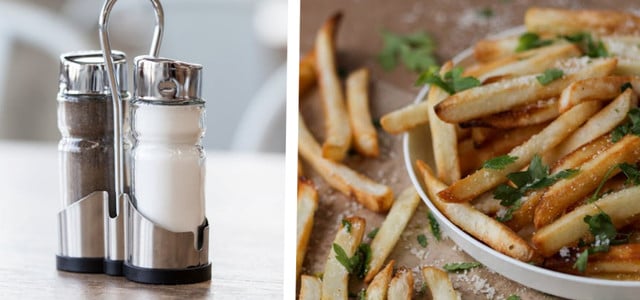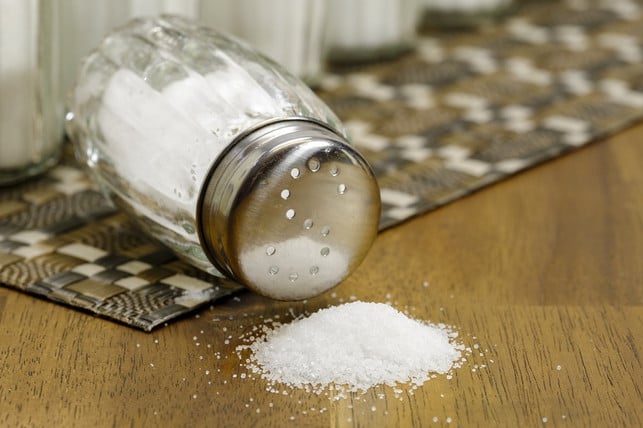
A pinch of salt for a round taste should not be missing even in the cake. And yet we keep hearing: don’t eat that much salt! Only: how much salt is still okay? Why does the body need salt? And what happens if you reduce your salt consumption or even stop eating salt?
Salt belongs in the pasta water, in the salad and even in the cake and desserts. Only: Most people in Germany have too high salt consumption. You can find out what health consequences this can have and how you manage to eat less salt in this article.
Contents:
- What exactly is salt?
- Salt is not the same as salt?
- Salt is vital for the human body
- Salt: What is too much?
- What happens if you eat too much salt
- What happens when you stop eating salt?
- How to reduce your salt consumption
What exactly is salt?
On the one hand, we use salt to season, on the other hand, it is of great importance for the preservation of food: salt binds water and thereby removes the livelihood of the microorganisms. People have been using salt since antiquity to make food for longer.
Colloquially, we speak of salt and mean the dining salt used for human nutrition – also known as salt or table salt. Dining salt mainly consists of sodium chloride (NACL) and represents the main source of sodium and chloride: We lead to the body about 90 percent of the two electrolytes through dining salt.
Salt is not the same as salt?
There are different types of salt, such as the well-known Himalaya salt. But: How much do the different salts differ and are there really great qualitative differences?
In terms of taste, it makes a difference for our taste buds whether we have a fine salt crumb or a coarse grain of salt on the tongue and how the salt dissolves. In contrast to the size of the salt crystals, the color of the salt, on the other hand, has no major influence on the taste.
A distinction is made between salt according to the source from which it is obtained:
-
Sea salt is created by evaporating sea water
-
Rock salt is broken down inside Salzbergen
-
Siedesalz is created when heated from mountains of salt water heated from mountains
There are no big differences in the composition of the different types of salt: all salts mainly consist of sodium chloride. The minimal differences are not nutritionally significant.
In addition to these classic types of salt, there are salts that have a different nutritional meaning or a different taste through additives. These include iodine salt, iodine fluorine salt as well as spice and herbal salts.
Salt is vital for the human body
Salt is vital for the human body, because it can neither form sodium nor chloride itself and is therefore dependent on the supply of the two electrolytes by salt. Both electrolytes are indispensable for body functions such as maintaining the fluid balance and regulating blood pressure.
Without sodium and chloride, the body cannot absorb water in the cells. For this reason, for example, the supply of salt is very important when it comes to endurance sports. The body also needs sodium to forward stimuli in nerve fibers and thus for the function of the muscles. Chloride is part of the stomach acid.

Salt: What is too much?
The World Health Organization (WHO) recommends taking a maximum of five grams of salt per day. The German Nutrition Society (DGE) indicates an orientation value of up to six grams of dining salt a day – this corresponds to about a teaspoon of salt. For the vital body functions, 3.8 g salt would probably be sufficient.
However, studies show that most people in Germany consume significantly more salt per day. Women between the ages of 18 and 79 take up an average of 8.4 grams of salt per day. In men it is about 10.0 grams a day. Many people accept even larger quantities:
- 39 percent of women and 50 percent of men absorb over ten grams of salt per day.
- 15 percent of women and 23 percent of men are even over 15 grams of salt a day.
These figures show that the majority of the population is well above the vital supply and eats far too much salt – with negative health consequences.
What happens if you eat too much salt
If you are one of the people who eat too much salt, you will probably have an increased risk of developing high blood pressure. Because the body binds excess salt on water to keep the sodium concentration constant. This gives you thirst because the fluid requirement increases. The consequence of this: the blood volume increases and the increased pressure in the vessels contaminates heart, kidney and brain.
In many people, a permanently high salt consumption increases the risk of developing high blood pressure (hypertension). Hypertension is one of the most important risk factors for cardiovascular diseases and strokes.
However, there are differences in how much blood pressure reacts to salt in humans. A distinction is made between “salt sensitive” and “non -salt -sensitive” people: in salt -sensitive people, blood pressure changes due to a changed salt supply. In the case of non -salt -sensitive people, the changed supply does not affect blood pressure very little. Which salt type you belong to can only clarify a medical examination.
In the worst case, too much salt can even be fatal: a supply of one to two grams of salt per kilogram of body weight leads to death. However, taking these amounts of salt with food is very unlikely.
What happens when you stop eating salt?
Our body needs salt. It is not recommended to do without salt entirely. As self -experiments show, a few days without salt are enough to notice: If you take too little salt – i.e. electrolytes – and at the same time even do sports, sweat and drink a lot of water, get circulatory problems.
This can also happen: inside that drink too much water without salt (electrolytes). Hyponatremia describes the insufficient sodium concentration in the blood, which may even lead to death.
Reducing salt consumption is recommended for most people. If you reduce your salt consumption, this will have a positive effect on your health: after just a few weeks, your blood pressure will lower. Other effects on your health can be:
- The risk of cardiovascular diseases and a stroke are reduced.
- Due to a low -salt diet, you will eat less highly processed foods, which can also have a positive effect on your health.
- The reduction of your salt consumption will have a positive effect on your life expectancy overall.
How to reduce your salt consumption
A teaspoon of salt a day should be maximum: a lot – you may think now. But the six grams of six grams not only mean the amounts of salt that you use to salt or cook. The salt, which we absorb through processed foods, is also included – and that is the largest part.
In fact, we absorb most of the salt by eating food such as bread and rolls, meat, sausage and cheese. For example, a lye roll already contains a gram of salt and a Gouda slice of 0.6 grams of salt.
To reduce salt consumption, the following helps:
- Let it take it slowly: Get a few salt step by step. It is easier.
- Better use unprocessed products such as vegetables and fruit instead of processed food.
-
Cook and cheek yourself: So you can determine how much salt you use.
- Words with spices and herbs: You cannot replace salt, but complement it very well. Also read: Salance set: These alternatives season your food without salt
- If you consume processed foods, it is worth taking a look at the nutritional table and the grip on the low -salt variant.
Read more on utopia.de:
- Planetary Health Diet: This is how the perfect nutrition plan looks
- 10 foods that are not as healthy as you think
- Eat butter every day: that does it with your body
** marked with ** or orange underlined Links to sources of supply are partially partner links: If you buy here, you will actively support Techzle\.com, because we will then receive a small part of the sales proceeds. More information.